With the eruption of violence in western Myanmar, the plight of the Rohingya worsened, though perpetrators can be found on both sides of the ethnic and religious divide with power politics from Yangon adding a corrosive element to the mix
When photographer Suthep Kristasanawarin arrived in the western state of Rakhine in Myanmar almost two years ago, he sensed tension in the relatively peaceful town of Sittwe, the state capital.
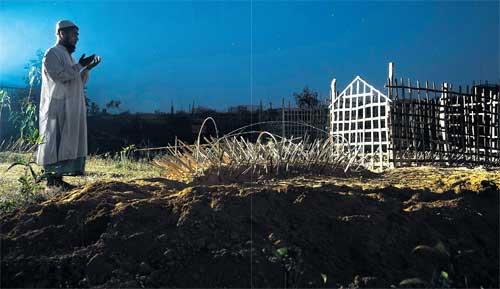
TO BETTER DAYS: A Rohingya refugee offers prayers for the dead in a makeshift camp. Unofficial camps housing thousands of Rohingyas lack sanitation and healthcare facilities as they are not under the supervision of the UN refugee agency.
"I could feel the deep distrust between ethnic minorities there _ the Buddhist Rakhine and Muslim Rohingya. I wasn't so surprised when I heard about the violence in Rakhine State; however, it came sooner that I thought," he said in a phone interview with Spectrum. He was referring to the killing and rioting that has torn through the western coastal region, separated from central Myanmar by the Arakan mountain range.
Suthep went there for his photo documentary undertaking called the Rohingya Project, which he has been working on since 2008, about the plight of the stateless ethnic group. Many have been forced to flee their hometowns in recent years for adjacent Bangladesh or Southeast Asian countries such as Thailand and Indonesia, with some going as far as Australia in search of a better life.
What he witnessed in Sittwe was mutual hatred.
Suthep recalled visiting a couple in a rural part of the district. The husband was a Rohingya who had just served time in the local prison _ for getting married to a Rakhine woman.
The wife was banished from her village after the marriage. And when the couple settled down together, they became a target of hatred.
"I was being watched by the whole town. Some villagers peeked in to see why I had anything to do with this couple. I thought I was at risk of being thrown out of the city if someone reported my visit to authorities, so I had no choice but to leave as quickly as possible," Suthep said.
The photographer believes the current loathing dividing ethnicities is a remnant of conflicts dating from imperialist times, when Myanmar was a British colony from the Anglo-Burmese (Myanmar) wars of 1824-1885 until 1948. The conflict between the Rohingya and Rakhine has turned into an open war with a massive casualty count.
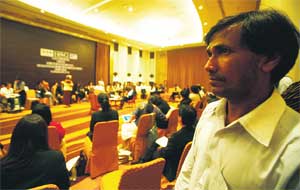
CHASED AWAY: Abu Karlam, a Rohingya exile who has been living in Thailand for 31 years after fleeing Myanmar.
Both the Rakhine and Rohingya are minorities with long ties to the region, and both have been treated as second class residents by the ruling Burmese; however, the treatment of the Rohingya has been far worse than that of other ethnic groups.
The Rohingya are Muslims of South Asian descent, while most Myanmar minorities are of Southeast Asian origin and predominantly Buddhist. The Rohingya are related to the Bengali groups in the Chittagong Division of neighbouring Bangladesh. Like the Buddhist Rakhine, they traverse both sides of the border.
According to a report by the Arakan Project, a non-governmental organisation working in the area, since the military took over Myanmar in 1962 the Rohingya have increasingly faced exclusion. In 1982, they were rendered stateless by the Burma Citizenship Law, which mainly confers the right to a nationality to members of the 135 national races listed by the government. The denial of citizenship is the key mechanism to institutionalising discrimination against the group. Severe restrictions on their movement and marriages, arrests, extortion, forced labour and confiscation of land have been arbitrarily imposed.
This discrimination also causes the Rohingya to occupy the bottom economic rung in the area.
Suthep says the Rohingya in Sittwe are treated as outcasts, working menial jobs for both the Burmese and the Rakhine, such as cleaners or water carriers. They are barred from having a higher education or working as government officers or teachers. Most of all, they feel they are being badly mistreated, which generates resentment against other groups.
The Arakan Project estimates that 270,000 Rohingya have fled to neighbouring Bangladesh in recent years and ended up in shelters set up by international organisations.
Many have been turned back, however, especially in recent weeks, as Bangladesh considers Rohingya, having lived in Myanmar for centuries, as non-citizens and a potential burden on the impoverished and overpopulated country's resources. Human Rights Watch last week urged Bangladesh to open its border to Rohingya, saying it was putting lives at risk.
Some Rohingya over the years have also fled to other countries in the hope of finding a place where they can live with integrity. Among them is Abu Karlam, a 51-year-old exile who has lived in Thailand for 31 years.
Abu Karlam was from a peasant family in Mynbia, a small town close to Sittwe. He said one day a platoon of soldiers stopped at his village and coerced teenagers to work as carriers in the fighting against other ethnic groups.
He fled back to his village after being badly beaten by soldiers. Fearing severe retribution from the authorities, he left his wife and young daughter behind and started the long hard journey to Thailand.
Though his life in Thailand has been a struggle, he believe it's still far better than living in his homeland.
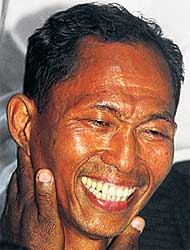
Ko Ko Gyi.
According to Abu Karlam, now vice-president of the Burmese Rohingya Association in Thailand, there are around 9,000 Rohingya across Thailand, both documented and illegal immigrants. In Bangkok between 300 and 400 are registered with the association.
Currently all of them are worried about what is happening in Rakhine State.
"We are trying to contact everyone we can think of to help Rohingya. We went to the UN office and also are pleading to the media to please help our people from being killed and starved," said Abu Karlam. "We are the victims. This is a scheme by the ruling class to drive us from our land."
However, they don't know whether their move will be fruitful. Though Abu Karlam said the Rohingya were victimised, many blamed the start of the violence on his people.
The Rohingya have been accused by the state media and the Rakhine of instigating the violence. The recent unrest began when a group of Muslim men were accused of raping and murdering a Rakhine woman. Retaliation by the Rakhine and large-scale riots followed. Government media and the Rakhine also blame the Rohingya for widespread rioting, looting and killing.
Chris Lewa from the Arakan Project told Spectrum that the number of deaths is unknown but certainly far higher than that provided by the government. Moreover, Ms Lewa believed law enforcement agencies are also responsible for many deaths.
Sittwe and Maungdaw, where the army has been deployed, have become calmer since Wednesday. According to Ms Lewa, the security situation is still precarious and extremely tense, with occasional reports of shooting and looting in these areas.
"Sectarian unrest has now spread to Rathedaung. Houses have been looted and torched in five Muslim villages in Rathedaung since Thursday night. One of these villages is Choot Pyin, close to the south of Maungdaw township. Frightened villagers from Rathedaung fled to South Maungdaw where locals gave them shelter. But the Nasaka, the border security forces, chased them and forced them to return to their village," said Ms Lewa.
She also expressed fears that the communal unrest could resurface and spread to new areas.
For Ms Lewa, the causes of this communal violence are varied and complex, and rooted in longstanding institutionalised racism in Myanmar and official policies of discrimination imposed on the Rohingya in Arakan.
The hostility of the Rakhine Buddhist community in Arakan towards the Rohingya is related to the perception that overpopulation in Bangladesh could threaten their territorial integrity.
Different in ethnicity and religion from the majority population in Myanmar, successive regimes have portrayed the Rohingya as illegal foreigners who deserve no rights to citizenship. The new government has reaffirmed these policies on national security grounds during parliamentarian sessions.
Both Ms Lewa and Suthep agreed that the shift from deep distrust to extreme violence is a downside of the recent reforms implemented by the Myanmar government to promote democracy in the country.
''The loosening of constraints has provided the space for such sectarian violence to erupt, but that is not the only cause,'' said Ms Lewa.
''The recent relaxation of authoritarian rule and more freedom of expression has been the vehicle to let loose simmering tensions and bring them to boiling point. The spark was the rape of a Rakhine woman allegedly by Muslims.''
On the evening of May 28, Ma Thidar Htwe, 26 and a resident of Thapraychaung in Rambree Township, was brutally raped and killed while returning home from nearby Kyauknimaw village.
Three suspects from nearby Kyaukhtara Muslim village, are in police custody. There is some question over whether they are Rohingya, but on June 3, 10 Muslims were killed by a Buddhist mob in an apparent revenge attack. Violence then became more pronounced on both sides.
When army troops were called out to help quell the violence on June 8, a dusk-to-dawn curfew was imposed, with President Thein Sein declaring a state of emergency in the area, giving the military full administrative powers to keep order. According to Ms Lewa, though, the order to stay indoors applied only to Rohingya.
Rakhine, however, have also been badly affected by the unrest. According to the state government, tens of thousands of people have been displaced by the violence, with 31,884 displaced people being sheltered at monasteries and schools. Of 2,528 houses that were burned down, 1,192 belonged to Rakhines and 1,336 belonged to Rohingya.
It was also reported that nine Buddhist monasteries and seven mosques were burned. Unrest hit eight areas in all: Maungdaw, Buthidaung, Sittwe, Rambree Island, Mrauk Oo, Ponna Kyun, Pauk Taw and Kyauktaw, with the most damage and deaths in Maungdaw and Sittwe.
As Spectrum went to press, according to Htein Lin, security and border affairs minister for Rakhine, 29 people _ 16 Muslim and 13 Buddhists _ had been killed since riots broke out on June 8, not including the mob attack of June 3. Large numbers of people still have no access to food and other important staple goods.
There have been some conflicting theories on the origins of the violence. One prominent former political prisoner and ally of Aung San Suu Kyi, Ko Ko Gyi, has blamed the problems in Rakhine State on elements coming from across the border. The Rohingya are not an ethnic group of the country, Ko Ko Gyi said.
Myanmar expert and author Bertil Lintner told The Week that ''the violence is clearly well orchestrated and not as spontaneous as we are being led to believe''.
''The government is very worried about the support commanded by Suu Kyi,'' Mr Lintner said. ''It wants to force her into a position where she has to make a pro-Rohingya public statement that could damage her popularity among Burma's Buddhists, where anti-Muslim sentiment runs high. On the other hand, if she remains silent she will disappoint those who support her firm stand on human rights.''
One thing that is certain is that the plight of the Rohingya will not be resolved soon.
''What we can do now is only pray to God to help protect those who are affected by this deadly situation,'' Mr Abu Karlam said.
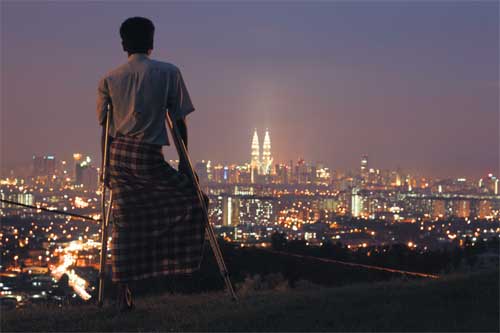
CRIPPLED DREAMS: A photo from Suthep Kristasanawarin’s Rohingya Project shows Mohammad Hussein, who fled to Malaysia three years ago hoping to find work. On the way he contracted an infection that was left untreated. When he received medical attention, his leg was amputated. He now relies on begging and help from other Rohingya for his survival.





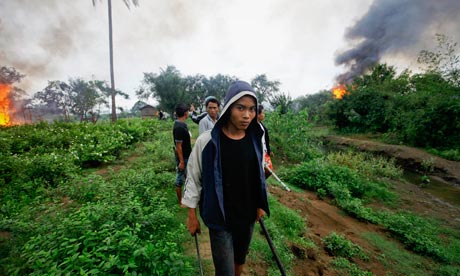



 Ko Ko Gyi.
Ko Ko Gyi.










